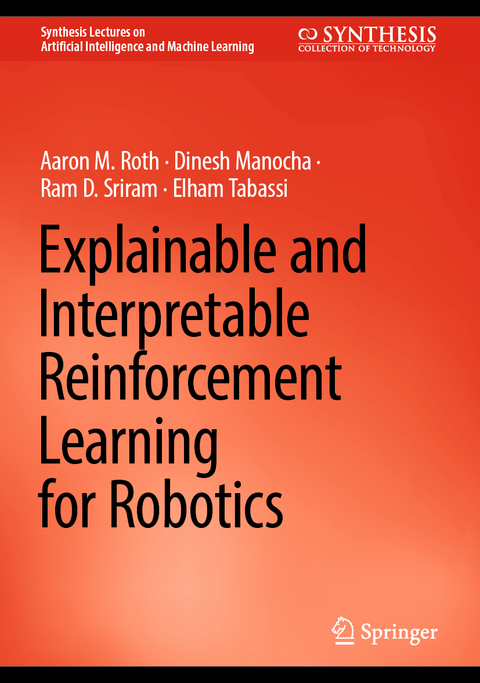
Explainable and Interpretable Reinforcement Learning for Robotics
Springer International Publishing (Verlag)
978-3-031-47517-7 (ISBN)
This book surveys the state of the art in explainable and interpretable reinforcement learning (RL) as relevant for robotics. While RL in general has grown in popularity and been applied to increasingly complex problems, several challenges have impeded the real-world adoption of RL algorithms for robotics and related areas. These include difficulties in preventing safety constraints from being violated and the issues faced by systems operators who desire explainable policies and actions. Robotics applications present a unique set of considerations and result in a number of opportunities related to their physical, real-world sensory input and interactions.
The authors consider classification techniques used in past surveys and papers and attempt to unify terminology across the field. The book provides an in-depth exploration of 12 attributes that can be used to classify explainable/interpretable techniques. These include whether the RL method is model-agnostic or model-specific, self-explainable or post-hoc, as well as additional analysis of the attributes of scope, when-produced, format, knowledge limits, explanation accuracy, audience, predictability, legibility, readability, and reactivity. The book is organized around a discussion of these methods broken down into 42 categories and subcategories, where each category can be classified according to some of the attributes. The authors close by identifying gaps in the current research and highlighting areas for future investigation.Aaron M. Roth is currently Head of Autonomy Technology for Black Sea. Previously, Aaron worked as a Research Scientist in the Distributed Autonomous Systems Group in the Navy Center for Applied Research in Artificial Intelligence at the Naval Research Laboratory and as a Researcher and PhD student at the University of Maryland in the GAMMA lab. In both capacities, he led projects conducting research into autonomous robots and artificial intelligence, with specific focus on reinforcement learning, explainable/interpretable artificial intelligence, AI Safety, robot navigation, and human-robot interaction. He has also worked at several technology startups, in industries spanning healthcare, finance, and mobile consumer applications. Aaron's published research has been reported on by news publications worldwide, and he has presented his research speaking at international conferences in the academic research community and given talks explaining science, robotics, and artificial intelligence to the general public. He is the creator of and contributor to multiple open-source software projects. He holds a B.S.E. in Electrical Engineering from University of Pennsylvania and an M.S. in Robotics from Carnegie Mellon University. Aaron was Conference Chair for the Third Annual Artificial Intelligence Safety Unconference in 2021, an international conference about AI Safety. In both paid and volunteer capacities, Aaron has provided technical mentorship to undergraduate students, graduate students, and industry career professionals across the United States, Europe, and Australia. He is also a published science fiction author. Aaron has consulted on artificial intelligence topics for creative professionals including science fiction authors and game designers."
Ram D. Sriram is currently the chief of the Software and Systems Division, Information Technology Laboratory, at the National Institute of Standards and Technology. Before joining the Software and Systems Division, Sriram was the leader of the Design and Process group in the Manufacturing Systems Integration Division, Manufacturing Engineering Laboratory, where he conducted research on standards for interoperability of computer-aided design systems. Prior to joining NIST, he was on the engineering faculty (1986-1994) at the Massachusetts Institute of Technology (MIT) and was instrumental in setting up the Intelligent Engineering Systems Laboratory. He has extensive experience in developing knowledge-based expert systems, natural language interfaces, machine learning, object-oriented software development, life-cycle product and process models, geometrical modelers, object-oriented databases for industrial applications, health care informatics, bioinformatics, and bioimaging. Sriram has co-authored or authored nearly 300 publications, including several books. Sriram was a founding co-editor of the International Journal for AI in Engineering. Sriram received several awards including: an NSF's Presidential Young Investigator Award (1989); ASME Design Automation Award (2011); ASME CIE Distinguished Service Award (2014); the Washington Academy of Sciences' Distinguished Career in Engineering Sciences Award (2015); ASME CIE division's Lifetime Achievement Award (2016); CMU CEE Lt. Col. Christopher Raible Distinguished Public Service Award (2018); IIT Madras Distinguished Alumnus Award (2021). Sriram is a Fellow of AAIA, AIBME, ASME, AAAS, IEEE, IET, INCOSE, SMA, and Washington Academy of Sciences, a Distinguished Member (life) of ACM , a Senior Member (life) AAAI, and an Honorary Member of IISE. Sriram has a B.Tech. from IIT, Madras, India, and an M.S. and a Ph.D. from Carnegie Mellon University, Pittsburgh, USA. Elham Tabassi is a Senior Research Scientist at the National Institute of Standards and Technology (NIST) and the Associate Director for Emerging Technologies in the Information Technology Laboratory (ITL). She also leads NIST's Trustworthy andIntroduction.- Classification System.- Explainable Methods Organized by Category.- 4 Key Considerations and Resources.- Opportunities, Challenges, and Future Directions.
| Erscheinungsdatum | 20.03.2024 |
|---|---|
| Reihe/Serie | Synthesis Lectures on Artificial Intelligence and Machine Learning |
| Zusatzinfo | XV, 114 p. 14 illus., 13 illus. in color. |
| Verlagsort | Cham |
| Sprache | englisch |
| Maße | 168 x 240 mm |
| Themenwelt | Informatik ► Theorie / Studium ► Künstliche Intelligenz / Robotik |
| Schlagworte | Autonomous Robotics • Explainable AI • Intelligent Systems • interpretable AI • Learning Algorithms • Learning Systems • Robot Learning • Safe AI |
| ISBN-10 | 3-031-47517-8 / 3031475178 |
| ISBN-13 | 978-3-031-47517-7 / 9783031475177 |
| Zustand | Neuware |
| Haben Sie eine Frage zum Produkt? |
aus dem Bereich


